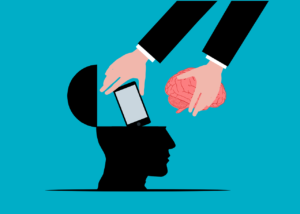
Image by Mohamed Hassan from Pixabay
Is technology improving relationships? With each passing year, it becomes more difficult to make the case that it is. The landline telephone made it possible to stay in touch with distant friends and relatives (and spared people from running errands), which were widely viewed as good things. Television was more of a mixed blessing. More so than radio, it tended to preoccupy the viewer, since both of the dominant senses were involved; as a result, communication with family often got crowded out. (“Not now! I’m watching TV!”) Years ago, I first saw something that I found jarring at the time: a couple was out for a stroll, but each one was talking into their own cell phone. (Presumably they were talking telephonically to other people, not to each other.) Since then, phones have gotten “smart” (i.e., visual, with lots of information), so now you can be preoccupied on the phone without even speaking to someone.
The Internet and its related electronic devices have taken the user’s level of engagement to another level. It can be reasonably said that preoccupation has given way to addiction. In the January 2022 issue of IEEE Spectrum (“AI’s real worst-case scenarios”; https://ieeexplore.ieee.org/document/9676367), Natasha Bajema observes how smartphones and the algorithms behind them work to “steal our attention away from our jobs, families and friends, responsibilities, and even our hobbies. To make matters worse, the content often makes us feel miserable and worse off than before.”
Her characterization rings true: stealing our attention from what matters, like friends and families. What are the long-term implications of such technology? What will our society look like when a generation of children grows up having been robbed of meaningful time with other family members? Even more sobering is the prospect of that robbed generation raising their own kids, without having first experienced a proper family life for themselves. What will become of their kids?
It’s incumbent on each of us to make wise choices in how we spend our time. I once heard a pastor make the point by stating the obvious: “When you come to the end of your life, it will be spent. Everyone spends their life somehow.” It’s become too easy to spend your life in a virtual world, instead of the real one.